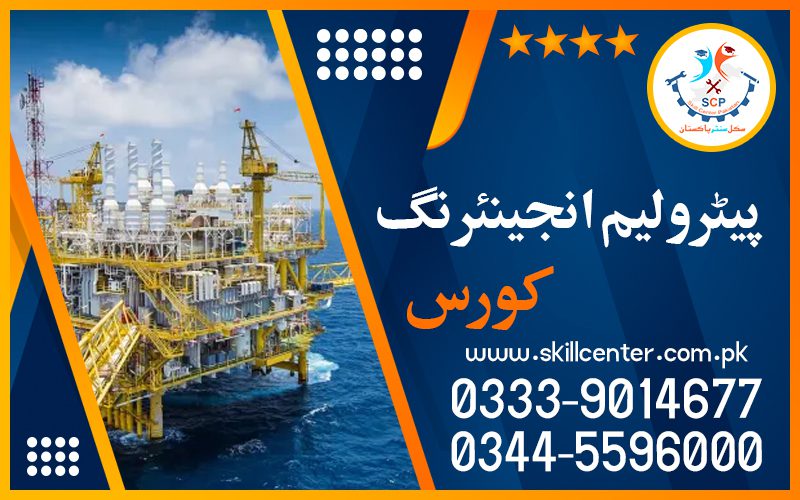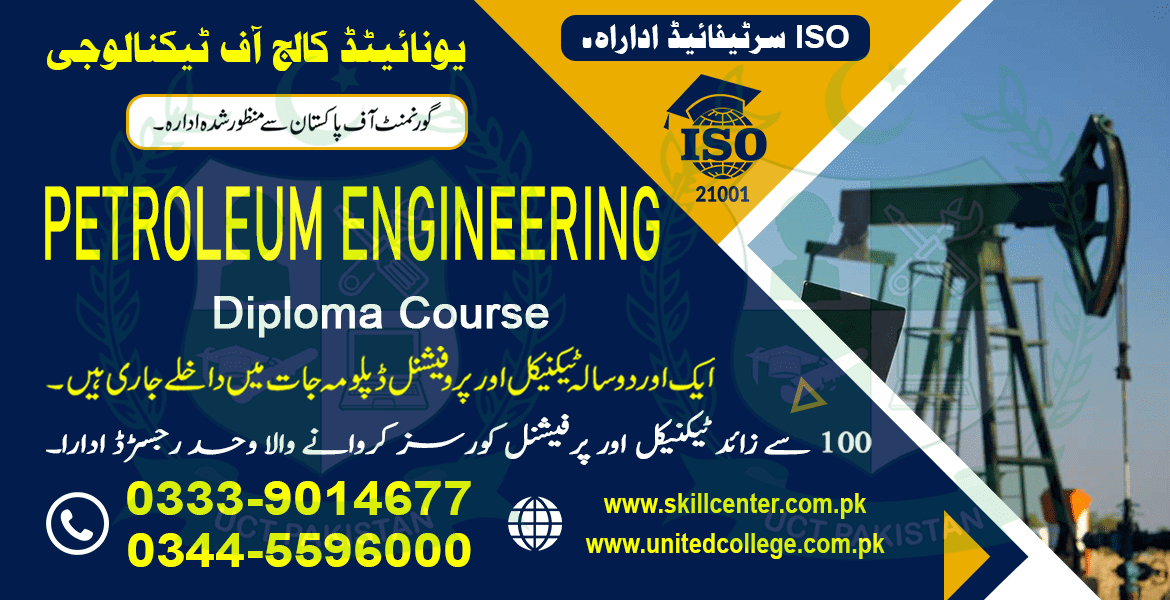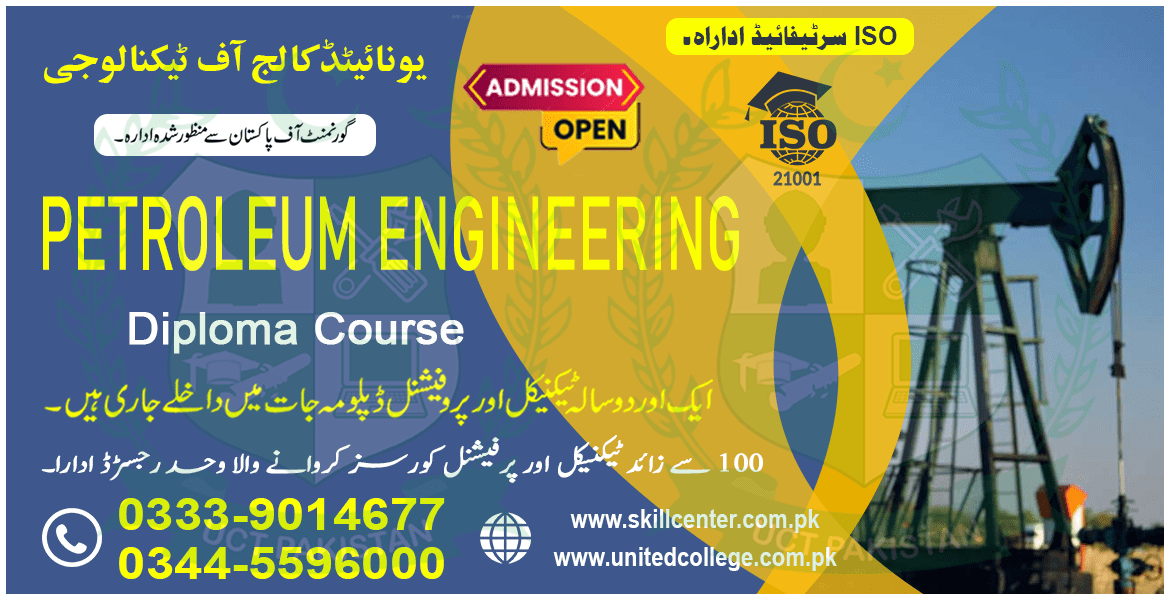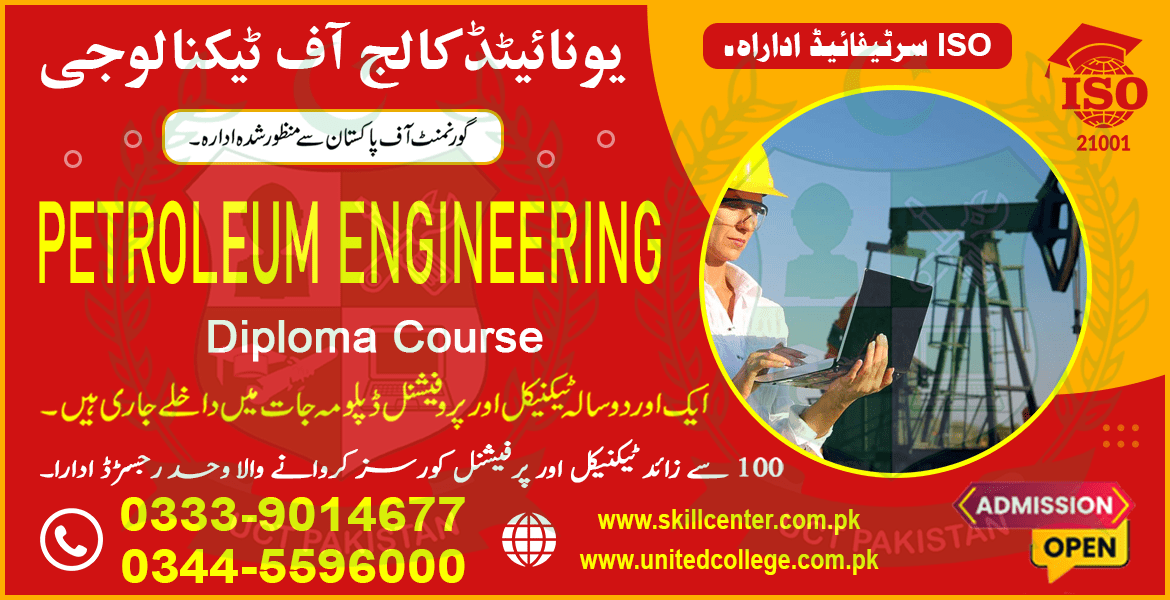Petroleum Engineering Course in Rawalpindi Islamabad 0333-9014677





Introduction
The production, processing, and exploration of crude oil and natural gas fall within the purview of petroleum engineering, a subfield of engineering. It involves the creation and development of technologies and procedures for locating, extracting, and processing hydrocarbons from subsurface reserves using scientific and engineering concepts. The development and implementation of techniques for extracting oil and gas from reservoirs, designing drilling and production machinery, and assuring the security and effectiveness of oil and gas operations are all the responsibility of petroleum engineers. They collaborate closely with geologists, geophysicists, and other experts to locate possible oil and gas deposits, assess their viability, and create extraction strategies.
Petroleum geology, reservoir engineering, drilling engineering, production engineering, well completion design, well stimulation methods, and petroleum economics are just a few of the subjects included in a standard petroleum engineering school curriculum. Students also study the laws that regulate the business as well as the environmental and safety concerns related to the production of oil and gas.
Graduates of petroleum engineering degrees can work for a variety of enterprises in the oil and gas sector, including those engaged in exploration and production, oilfield services, consultancy, and government. They could work as petroleum geologists, reservoir engineers, drilling engineers, production engineers, or petroleum economists, among other positions. Petroleum engineers are well-equipped to handle the difficulties of locating and producing energy resources in an increasingly complicated and interconnected world because of their solid grounding in science, technology, and engineering concepts.








Petroleum Engineering Training Course Outline
A typical petroleum engineering course curriculum includes a range of subjects covering various aspects of the industry. Here is a sample course outline
Introduction to Petroleum Engineering
- Overview of the Petroleum Industry
- History of petroleum exploration and production
- Energy and the Global Economy
Petroleum Geology
- Basic geologic principles
- Sedimentary rocks and their formation
- Petroleum traps and reservoirs
- Geologic mapping and seismic interpretation
Reservoir Engineering
- Fluid properties and behavior
- Reservoir rock properties
- Reservoir characterization
- Reservoir simulation
Drilling Engineering
- Drilling rig components and systems
- Drilling fluids and circulation
- Drill bit types and selection
- Wellbore stability and formation damage
Production Engineering
- Well-completion and stimulation techniques
- Artificial lift systems
- Production logging and optimization
- Surface facilities and equipment
Petroleum Economics
- Oil and gas reserves estimation
- Financial analysis and investment decision-making
- The oil and gas business is subject to risk and unpredictability.
- Environmental and social costs and benefits of oil and gas production
Professional Practices and Ethics
- Professional conduct and responsibility
- Health, safety, and environmental considerations
- Legal and regulatory frameworks
- Social and ethical implications of petroleum engineering
The Petroleum Engineering Course in Rawalpindi and Islamabad, provided through Skill Center Pakistan in Rawalpindi, offers a nicely rounded curriculum that covers all critical aspects of the oil and gas industry. From foundational subjects like petroleum geology and drilling strategies to advanced topics together including reservoir engineering and manufacturing optimization, the route guarantees college students benefit from both theoretical information and practical skills.
The inclusion of company-applicable tasks and simulations in addition enhances mastery, making people prepared for real-world challenges. By the end of this system, college students could have in-depth knowledge of petroleum engineering ideas and be geared up to pursue a successful career in this high-demand subject. This path is a first-rate possibility for all of us seeking to construct information and enhance in the energy field.






















































Eligibility Criteria for Petroleum Engineering Course
The Petroleum Engineering Course offered through Skill Center Pakistan in Rawalpindi is designed to cater to those who are enthusiastic about pursuing a career in the oil and gas industry. To ensure that scholars are nicely organized to fulfill the demands of the program, the following eligibility criteria have been hooked up:
Educational Qualification:
Candidates ought to have finished at least an intermediate degree of education, ideally in Pre-Engineering (FSc) or an equivalent qualification. Graduates with a diploma in engineering, geology, or associated fields also are eligible to use. This guarantees that scholars have foundational expertise in medical concepts necessary for the path.
Age Limit:
While there is no strict age limit, the route is generally ideal for people elderly between 18 to 35 years. However, exceptions may be made for specialists in search of to decorate their talents or transition into the petroleum engineering field.
Basic Skills and Knowledge:
A strong grasp of middle subjects together with arithmetic, physics, and chemistry is crucial, as these shape the basis of many principles blanketed in the course. Candidates should be comfortable with trouble-fixing and analytical wondering.
Language Proficiency:
Since the course clothes and practice are added in English, applicants need to possess simple skill ability in studying, writing, and expertise in the language. This guarantees easy communique and comprehension in the course of this system.
Interest and Commitment:
An actual interest in the oil and gas industry, in conjunction with a commitment to getting to know and professional increase, is quite recommended. The direction includes each theoretical and practical component, requiring dedication and enthusiasm from contributors.
Technical Aptitude:
While not obligatory, familiarity with fundamental laptop competencies and technical gear may be useful, as the direction may involve software packages and simulations applicable to petroleum engineering.
By assembling these eligibility standards, students can make certain they’re properly prepared to adopt the Petroleum Engineering Course and make the maximum of the opportunities it offers for career advancement inside the electricity sector. Skill Center Pakistan welcomes prompted folks who are keen to construct a sturdy basis in this dynamic and worthwhile field.


































Future of Petroleum Engineering
The destiny of petroleum engineering is a subject of exceptional interest as the worldwide energy place undergoes a transformative shift. While the location is more and more embracing renewable electricity belongings, the choice for oil and fuel remains large, making sure that petroleum engineers will hold to play a critical position in meeting global strength dreams. This scenario is evolving, driven by technological improvements, environmental troubles, and the need for sustainable practices. Below, we find out the critical factors inclinations, possibilities, and worrying situations shaping the future of petroleum engineering.
1. Continued Demand for Oil and Gas
Despite the upward push of renewable power, o, il and gasoline are anticipatedbelive as crucial components of the worldwide electricity aggregate for many years come back once more. Emerging economies, specifically, will depend carefully on fossil fuels to aid industrialization and urbanization. Petroleum engineers are probably critical in ensuring efficient extraction, manufacturing, and distribution of this property. Their statistics can be crucial in maximizing restoration from gift reserves and exploring new fields in increasingly hard environments, which include deepwater and Arctic areas.
2. Technological Advancements Driving Innovation
Petroleum organizations are the primary fringe of technological innovation. Advances in artificial intelligence (AI), tool studying, and massive facts analytics are revolutionizing how oil and gas operations are finished. Petroleum engineers are leveraging the one’s generation to optimize drilling techniques, beautify reservoir modeling, and count on device disasters, essential to stepping forward average normal performance and price financial economic financial savings. Additionally, automation and robotics are reducing the want for human intervention in hazardous environments, improving protection and productivity.
3. Focus on Sustainability and Environmental Responsibility
As the place grapples with climate exchange, the petroleum business enterprise is under stress to adopt more sustainable practices. Petroleum engineers are increasingly more involved in developing generation for carbon seize, utilization, and garage (CCUS), which reduces greenhouse fuel emissions. They also go for walks to minimize the environmental effects of drilling and production sports activities via advanced waste control, water conservation, and reduced flaring. These efforts aren’t exceptional in addressing environmental troubles but furthermore setting out new professional possibilities in the green energy area.
4. Transition to a Low-Carbon Economy
The global shift inside the route of a low-carbon economic tool offers worrying conditions and possibilities for petroleum engineers. While the call for traditional fossil fuels may decline over a long time, petroleum engineers can comply with their capabilities to grow areas that embody geothermal energy, hydrogen production, and energy storage. Their statistics in subsurface exploration and beneficial useful resource manipulations are incredibly transferable, making them treasured humans to the renewable electricity region.
5. Challenges and Adaptability
The future of petroleum engineering is not without its annoying situations. Fluctuating oil costs, geopolitical uncertainties, and increasing regulatory pressures can affect device balance and company increase. To thrive in this evolving panorama, petroleum engineers want to be adaptable, continuously updating their abilities and recognizing a manner to live relevantly. Interdisciplinary collaboration and a focus on innovation can be key to overcoming the ones demanding situations and ensuring extended-term career achievement.
6. Career Opportunities and Growth
The call for professional petroleum engineers is predicted to stay robust, mainly in areas with extremely good oil and fuel reserves. Professionals with data in advanced technology, sustainability, and renewable strength integration may be specially in call for. Additionally, the employer offers opportunities for global mobility, permitting engineers to paint on international duties and advantage of numerous reviews.
































































Career Opportunities in Petroleum Engineering
The Petroleum Engineering Course in Rawalpindi, Islamabad, provided by Skill Center Pakistan in Rawalpindi-Islamabad prepares students for a lot of profitable career paths within the oil and fuel industry. Here are a number of the key opportunities available to graduates:
1. Petroleum Engineer
Petroleum engineers play a vital position in designing and imposing techniques to extract oil and fuel from underground reservoirs. They focus on optimizing production and ensuring efficient and useful resource recuperation.
2. Reservoir Engineer
Reservoir engineers’ attention is on reading reservoir statistics to estimate the amount of recoverable oil and gasoline. They expand techniques to maximize extraction at the same time as minimizing expenses and environmental effects.
3. Drilling Engineer
Drilling engineers oversee the making g plans and the execution of drilling operations. They make certain that wells are drilled adequately, correctly, and in compliance with enterprise standards.
4. Production Engineer
Production engineers manipulate the everyday operations of oil and gas fields. They troubleshoot manufacturing troubles, optimize procedures, and ensure easy operations.
5. Well Testing and Evaluation
Professionals in this field specialize in checking out wells to assess their performance and productivity. They examine information to make guidelines for improving output.
6. Petroleum Geologist
Petroleum geologists observe geological formations to pick out potential oil and gas reserves. They play a key role in exploration and aid discovery.
7. Field Operations Manager
Field operations managers oversee the complete production process, making sure that operations run easily and successfully. They manage groups, budgets, and devices.
8. Research and Development
For the ones interested in innovation, careers in R&D involve developing new technologies and techniques to improve oil and gasoline extraction and production.
9. Consulting and Project Management
Petroleum engineers can also work as consultants or venture managers, imparting professional advice and leading large-scale projects for electricity groups.
10. International Opportunities
With the worldwide demand for electricity specialists, graduates can discover professional opportunities in international markets, working with multinational organizations and gaining publicity for diverse projects.
By enrolling in the Petroleum Engineering Course in Rawalpindi, Islamabad at Skill Center Pakistan, college students benefit from the abilities and understanding needed to excel in these roles, making them particularly aggressive inside the task market and starting doors to a successful career in the field.




























































Duration and Fee Structure
Skill Center Pakistan gives a nicely-dependent Petroleum Engineering Course in Rawalpindi, designed to cater to the desires of aspiring professionals within the oil and gasoline industry. Below is a detailed breakdown of the route duration and price shape to assist students plan their enrollment correctly.
Course Duration
The Petroleum Engineering Course is designed to be completed within three to 6 months, depending on the student’s preferred tempo and agenda. The software gives examination options:
- Full-Time Plan (three Months):
- Ideal for students who want to complete the route speedily, this extensive plan entails day-by-day instructions and palms-on education classes.
- Part-Time Plan (6 Months):
- Suitable for working specialists or people with different commitments, this bendy plan allows college students to attend instructions on weekends or in the evenings.
Both options make certain that students acquire a complete education in key regions consisting including drilling, reservoir engineering, production techniques, and petroleum geology.
Fee Structure
The rate for the Petroleum Engineering Course in Rawalpindi, Islamabad, is affordable, making it available to a wide range of rookies. Skill Center Pakistan also presents bendy fee options to ease the monetary burden on college students.
- Total Course Fee: The actual rate can vary depending on the chosen study plan and any ongoing promotions. For the most correct and up-to-date data, college students are cautioned to touch the admissions office without delay.
- Installment Plans: To accommodate students’ financial needs, the path price may be paid in clear,n month-to-month installments.
- Discounts and Scholarships: Skill Center Pakistan sometimes gives discounts or scholarships for deserving candidates. Interested college students need to inquire about eligibility standards throughout the admission technique.
Why Choose This Course?
The aggregate of a bendy duration and a transparent rate structure makes this course a wonderful preference for people seeking to construct a profession in petroleum engineering. Whether you’re a clean graduate or a professional searching to upskill, this software provides the knowledge, palms-on experience, and enterprise insights needed to be successful within the strength area.
For additional info or to sign up, visit Skill Center Pakistan’s workplace in Rawalpindi-Islamabad or contact their admissions group for personalized guidance.
Course Duration MONTHSHSTH
Total Fee: 70,000/-







































Skill Center Pakistan's Reputation
Skill Center Pakistan has hooked up itself as a leading institution for expert and technical schooling in Rawalpindi and Islamabad, incomes a strong recognition for excellence and reliability. Known for its dedication to quality schooling, the center gives industry-applicable publications designed to fulfill the evolving needs of the job market.
Experienced Instructors and Practical Learning
One of the important thing factors behind Skill Center Pakistan’s reputation is its group of tremendously certified and experienced teachers. These professionals deliver real-world know-how to the schoolroom, making sure college students gain both theoretical understanding and realistic abilities. The middle emphasizes palms-on gaining knowledge through initiatives, simulations, and enterprise-aligned training, making ready students to excel in their chosen fields.
Focus on Student Success and Career Development
Skill Center Pakistan is dedicated to assisting college students obtain their career goals. The organization presents career steerage, job placement assistance, and possibilities for professional increase, making it a preferred choice for people searching to upskill or transition into new industries. Its cognizance of student fulfillment has ended in a growing network of happy alumni who have long gone on to steady rewarding positions in their respective fields.
Positive Feedback and Trusted Reputation
Over the years, Skill Center Pakistan has garnered consistent positive feedback from students and experts alike. Its transparent technique, low costs, and commitment to delivering exquisite education have earned it the agreement of the network. The middle’s reputation as a dependable and legitimate organization continues to grow, solidifying its function as a pacesetter in expert schooling within the place.
Industry-Relevant Curriculum and Modern Facilities
Skill Center Pakistan stands proud of its updated curriculum, which is frequently up to date to reflect the ultra-modern enterprise traits and technology. The middle also boasts contemporary facilities, consisting of nicely-equipped labs and educational gear, making sure college students acquire comprehensive and realistic knowledge of revel in. This recognition on staying modern-day with industry standards similarly complements its recognition as a ahead-questioning educational organization.
Community Engagement and Trust
Skill Center Pakistan actively engages with the local people and enterprise companions, fostering strong relationships that benefit its students. Through workshops, seminars, and collaborations with industry specialists, the middle ensures its packages remain relevant and impactful. This network-oriented technique has similarly bolstered its recognition as a trusted and respected institution in the area of professional schooling.












































Practical Training and Facilities
The Petroleum Engineering Course presented using Skill Center Pakistan in Rawalpindi locations a sturdy emphasis on practical schooling to make certain college students are nicely prepared for the demands of the oil and fuel enterprise. The program is designed to bridge the space between theoretical know-how and real-global utility, offering students hands-on revelations that are critical for success in this field.
Hands-On Training
Students interact in sensible sessions using superior equipment and technologies, which include drilling simulators, reservoir modeling software programs, and production optimization systems. These gear permit rookies to simulate real-existence eventualities, consisting of drilling operations, reservoir control, and well of completion, giving them a deeper expertise of industry procedures. Additionally, the course consists of area-primarily based initiatives and case studies that replicate real demanding situations faced in the petroleum area, enabling students to develop problem-solving skills and technical know-how.
Modern Facilities
Skill Center Pakistan is ready with modern facilities to guide sensible getting to know. The middle capability is a devoted petroleum engineering lab wherein college students can behavior experiments and examine statistics related to drilling, manufacturing, and reservoir engineering. A completely prepared pc lab is likewise available, providing entry to industry-preferred software programs for simulation and modeling. These facilities create immersive mastering surroundings that mirror the situations of a professional place of business.
Expert-Led Workshops
The sensible education is in addition more advantageous by using interactive workshops led by industry specialists with years of experience in petroleum engineering. These workshops focus on applying theoretical ideas to actual-world problems, presenting college students with precious insights into today’s industry practices and technologies.
Industry-Ready Preparation
By combining hands-on schooling with modern centers and expert steerage, Skill Center Pakistan ensures that scholars graduate with the technical abilities and self-belief needed to excel in the petroleum engineering discipline. This practical method now not simplest enhances studying but additionally prepares students for immediate entry into the personnel, making them incredibly competitive in the activity market.









































Online vs. On-Campus Learning
Choosing between online and on-campus mastering can appreciably affect academic enjoyment. Each mode of studying has its very own set of advantages and demanding situations, and knowledge of the variations can help you make a knowledgeable choice primarily based on your non-public and expert desires.
Flexibility and Convenience
- Online Learning: One of the most critical benefits of online mastering is its flexibility. You can get the right of entry to route materials, attend lectures, and entire assignments from anywhere at any time. This makes it a brilliant alternative for operating professionals, dead, sandworms, or individuals with distinct commitments. However, it requires robust self-motivation and time management skills to stay on the right track.
- On-Campus Learning: On-campus packages look at a fixed schedule, requiring you to wait for classes individually at specific times. This form may be useful for people who thrive in the ordinary however may be plenty much less on hand for people with busy or unpredictable schedules.
Learning Environment and Interaction
- Online Learning: Online courses regularly depend on pre-recorded lectures, communication boards, and virtual conferences. While this allows for asynchronous studying, it could lack the immediacy of face-to-face interactions. Building relationships with instructors and buddies can be harder even though many structures now provide interactive tools to bridge this hollow.
- On-Campus Learning: On-campus studying provides a traditional examination room with a direct right of entry to teachers and classmates. This fosters actual discussions, collaborative tasks, and networking opportunities. The fingers-on revel in and instantaneous remarks can beautify facts and engagement.
Resources and Support
- Online Learning: Online programs normally offer digital resources along with e-books, video tutorials, and online libraries. Support offerings, like instructional advising and technical assistance, are frequently available remotely. However, entry to physical facilities like labs or libraries may be limited.
- On-Campus Learning: On-campus students have direct get entry to to physical assets, consisting of libraries, laboratories, and entertainment centers. They moreover gain from in-individual resource services, such as career counseling and tutoring, that can decorate the general knowledge of enjoy.
Cost and Accessibility
- Online Learning: Online courses are regularly extra less highly priced, as they dispose of expenses related to commuting, housing, and campus centers. They also make training available to human beings in far-flung regions or the ones no longer able to relocate for studies.
- On-Campus Learning: On-campus applications tend to be higher priced because of extra costs for campus offerings and lodging. However, they provide an extra immersive revel in and get the right of entry to a wider range of extracurricular activities.



















































Comparison with Other Institutes
When evaluating the Petroleum Engineering Course in Rawalpindi, Islamabad, provided by Skill Center Pakistan in Rawalpindi, with one-of-a-kind institutes, several key elements highlight its superiority:
Industry-Focused Curriculum:
Unlike many institutions that are cognizant, particularly of theoretical expertise, Skill Center Pakistan integrates realistic, enterprise-applicable training into its curriculum. This consists of hands-on initiatives, simulations, and case research that put together students for actual international worrying situations within the oil and gas industry.
Experienced Instructors:
The route is taught using seasoned specialists with full-size experience in the petroleum industry. This guarantees that scholars acquire up-to-date information and insights, which is regularly missing in institutes with much less skilled colleges.
Affordable Fees:
Skill Center Pakistan gives a price range-friendly route, making pleasant schooling available to a much broader target audience. In assessment, many special institutes price notably better prices without providing an identical diploma of sensible training or career manual.
Flexible Learning Options:
The institute offers bendy elegance schedules, inclusive of weekend and evening instructions, catering to going for walks experts and students alike. This flexibility isn’t always usually to be had at different institutes, which might also have inflexible timings.
Career Support and Networking:
Skill Center Pakistan has strong ties with the oil and gasoline company, providing college students with better networking possibilities, internships, and procedure placements. Many other institutes lack such sturdy industry connections, restricting their students’ professional possibilities.
Personalized Attention:
With smaller magnificence sizes, Skill Center guarantees customized interest for every scholar, helping them hold close complicated principles more effectively. This is a stark evaluation of large institutes in which college students often wander away in crowded lecture rooms.
In summary, Skill Center Pakistan’s Petroleum Engineering Course in Rawalpindi, Islamabad, stands proud because of its practical method, affordability, skilled university, and strong industry linkages, making it a top preference for aspiring petroleum engineers in Rawalpindi and Islamabad.




































Certification
Overview of Certification
Upon achievement completion of the Petroleum Engineering Course at Skill Center Pakistan, students get hold of an identified and industry-valued certification. This certification is a testament to the candidate’s know-how in key areas of petroleum engineering, which include drilling operations, reservoir management, production techniques, and petroleum geology. It is designed to satisfy company requirements, ensuring graduates are nicely-organized for expert roles in the oil and gasoline place.
Certification Process
The certification device is thorough and consists of theoretical tests and realistic evaluations. Students have to expose a robust know-how of center standards and the capacity to use this understanding in actual worldwide eventualities. This dual technique guarantees that licensed people are not handiest knowledgeable but also professional in handling the technical and operational demanding situations of the enterprise.
Industry Recognition
The certification furnished by way of Skill Center Pakistan is tremendously seen through employers in the oil and gasoline region. It serves as proof of the candidate’s dedication to expert improvement and their readiness to contribute efficaciously to the field. This recognition complements professional potentialities, making licensed individuals greater aggressive in the challenging marketplace.
Benefits of Certification
- Career Advancement: The certification opens doors to diverse possibilities in exploration, production, and control roles within the strength area.
- Lifetime Credential: The certification remains legitimate for the duration of your profession, supplying long-term blessings.
- Enhanced Employability: It can be showcased on resumes, LinkedIn profiles, and venture interviews, giving candidates an aggressive side.
- Professional Credibility: The certification displays an excessive diploma of information and strength of mind, making licensed individuals precious assets to any employer.
Conclusion
The Petroleum Engineering Course certification from Skill Center Pakistan is more than only a report—it’s miles a gateway to a successful profession within the oil and gas enterprise. By incomes this certification, you showcase your mastery of essentiaabilitieses and knowledge, position yourself as a certified and equipped expert within the challenge. Whether you are an amateur or a skilled professional, this certification is a treasured asset for engaging in your professional goals.











































Admission Process for the Petroleum Engineering Course
The admission method for the Petroleum Engineering Course in Rawalpindi, Islamabad, at Skill Center Pakistan is designed to be simple, transparent, and handy to all aspiring college students. Below is a step-by-step manual that will help you navigate the technique:
Step 1: Obtain the Admission Form
Interested candidates can start by traveling to the legitimate internet site of Skill Center Pakistan or contacting the center without delay to request the admission form. The form is likewise to be had on-site for those who choose to go to the Rawalpindi-Islamabad campus in person.
Step 2: Fill Out the Application Form
The admission shape calls for candidates to offer fundamental personal information, academic historical past, and any previous experience within the discipline of petroleum engineering or associated disciplines. Ensure all info is accurate and complete to avoid delays in processing.
Step 3: Submit Required Documents
Along with the utility form, applicants must submit copies of their educational certificates, CNIC/B-shape, and recent pictures. Some cases might also require extra documents, so one can be communicated through the admission crew.
Step 4: Attend an Orientation or Interview
Once the utility is submitted, applicants can be invited for a quick orientation consultation or interview. This step enables the institute to assess the candidate’s eligibility, professional dreams, and suitability for the direction.
Step 5: Fee Payment and Enrollment
After approval, candidates will acquire an admission provide. To steady their seat, college students must whole the price fee system. Skill Center Pakistan gives bendy fee plans to accommodate exclusive financial situations.
Step 6: Start Your Classes
Once the admission process is complete, students can be furnished with a category timetable and path substances. Classes usually begin shortly after enrollment, ensuring a clean transition into this system.
For any questions or assistance, the admission crew at Skill Center Pakistan is to be had to guide candidates via every step of the manner.







































FAQ's
What is the period of the Petroleum Engineering Course?
The route period normally levels from three to 6 months, depending on the program structure and level of specialization.
Who is eligible to join this path?
The route is open to college students with a historical past in engineering, geology, or associated fields. Beginners with a strong hobby in the oil and gasoline industry also are welcome.
What subjects are included in the directions?
The path covers key areas together with drilling engineering, reservoir engineering, manufacturing techniques, petroleum geology, and oilfield operations.
Are there any conditions for this direction?
Basic information in mathematics, physics, and chemistry is usually recommended, but no unique earlier experience in petroleum engineering is needed.
Is the direction concept-based or realistic-orientated?
The path combines theoretical knowledge and realistic training, consisting of hands-on initiatives, simulations, and industry-applicable case studies.
What professional opportunities are to be had after completing the direction?
Graduates can pursue roles that include drilling engineer, reservoir engineer, production engineer, petroleum geologist, and subject operator within the oil and gas enterprise.
Does the course provide certification?
Yes, upon successful finishing touch, students get hold of a recognized certification from Skill Center Pakistan, which complements their employability.
Are there any internship or task placement possibilities?
Skill Center Pakistan provides professional aid, including internship possibilities and process placement assistance, to assist college students in kickstarting their careers.
What is the charge shape for the route?
The price varies depending on the application duration and level. For distinct statistics, contact Skill Center Pakistan directly.
Where is the route positioned?
The course is offered at Skill Center Pakistan’s campus in Rawalpindi-Islamabad, imparting a handy and accessible getting-to-know surroundings.
For similar inquiries, sense unfastened to reach out to Skill Center Pakistan’s admission workplace.


















































































































































































